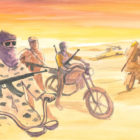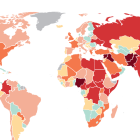Editor's Pick
Editor’s Pick: 2022’s Best Investigative Stories in French
|
Geographical diversity, the stories’ impact and uniqueness, the risks taken, and the techniques used were some of our criteria for selecting the strongest French language investigations of the year, selected by GIJN French Editor Alcyone Wemaëre, GIJN Francophone Africa Editor Maxime Domegni, GIJN French Assistant Editor Moran Kerinec, and Africa Assistant Editor Aïssatou Fofana.









